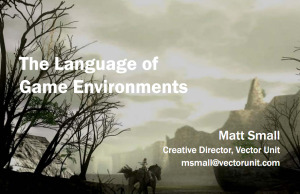Presentation: The Language of Game Environments
 Back in December, Creative Director Matt Small flew out to Washington DC to talk about "The Language of Game Environments" to a group of government and university researchers.
Back in December, Creative Director Matt Small flew out to Washington DC to talk about "The Language of Game Environments" to a group of government and university researchers.
The Game Changers conference was hosted by the University of Maryland Center for Advanced Study of Language (CASL) and the Foreign Service Institute (FSI). Attendees were mostly language-learning researchers interested in finding ways to use video games to aid in education and language acquisition.
Matt's presentation is a high-level overview of how game environments have changed during the last 30 years, and explores some of the techniques environment modelers and level designers use to guide players through these increasingly complex 3D spaces and interactions.
The presentation slides and video have now been posted on the CASL website. The video of the full 45-minute presentation and Q&A is here. If you're watching the video you may find it helpful to grab the PDF first, since you can't see many of the slides in the video. You can download the presentation PDF file here.
Also, the full roster of presentations are here: Game Changers Roundtable.
Particularly good are Brian Upton's presentation on how designers use and manipulate player anticipation, Mark Dank's on the changing game audience and how it's affected the industry, and Sarah Stocker's on the virtuous cycle of addiction in games. Keep in mind the audience here are all non-gamers, so some of this stuff may be a little "introductory" for the hardest of the hard-core, but it's all interesting stuff. You may also want to check out David Traum's presentation on the university research going on around natural language simulation.




